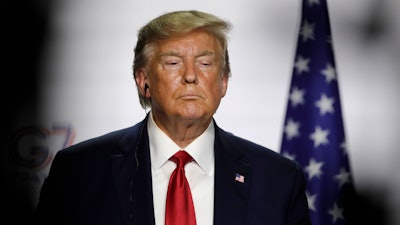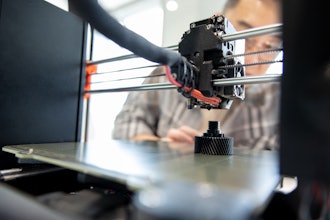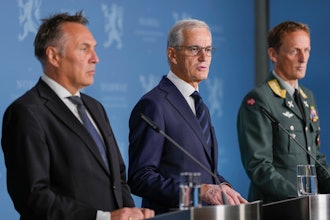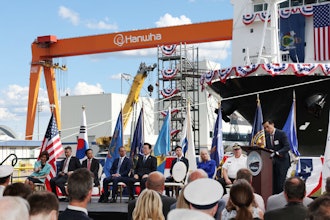
WASHINGTON (AP) — U.S. tariffs on Chinese goods are going up. Wait, President Donald Trump says he's having second thoughts. No, no, Trump may actually raise tariffs even higher. He's also demanding that U.S. companies leave China. Well, maybe not.
The communications on China from Trump and his administration since late last week — erratic, sometimes contradictory — are complicating their high-stakes talks with Beijing and elevating the risks to the fragile global economy.
The messaging has been confusing not just for Chinese officials as they formulate a response to whatever stance the administration is taking. It's also a problem for American businesses. Trump alarmed U.S. companies on Friday by threatening to invoke his presidential authority to order them out of China — a market of 1.4 billion where many American companies have spent decades establishing operations and building relationships with suppliers and customers.
The shifting positions and threats could eventually weaken the U.S. and world economies by leaving businesses paralyzed by uncertainty over whether and where to situate factories, buy supplies and sell products.
"We are on Mr. Trump's Wild Ride," said Jay Foreman, CEO of Basic Fun!, a toy company in Boca Raton, Florida, that imports from China. "Never have we ever experienced such an unhinged practice of governance. It's out of control and outrageous."
Speaking Monday at the Group of Seven summit in Biarritz, France, Trump was unapologetic.
"Sorry — it's the way I negotiate," he said, adding, "It has done very well for me over the years, and it is going very well for the country."
Negotiating a trade deal with China was always bound to be contentious and subject to fits and starts. The administration has accused Beijing of stealing trade secrets, extracting technology from U.S. companies and unfairly subsidizing its own businesses, and has demanded that it stop. What makes a resolution so elusive is that the administration's demands would undercut China's drive to achieve prosperity as the global leader in such transformative technologies as artificial intelligence and quantum computing.
Trump's negotiators are also seeking a way to enforce any deal — arguing, as many independent analysts have, that China frequently violated commitments it made to previous U.S. administrations.
The world's two biggest economies have imposed tariffs on hundreds of billions of dollars of each other's goods in the biggest trade conflict since the 1930s. The hostilities have hurt global trade and investment and strained the decelerating world economy.
"Trump's contradictory statements and erratic decision-making reflect the fact that he is an undisciplined, tactical thinker who deals with issues and events one-by-one and is guided by no fixed principles or long-term strategic vision," said Jeff Moon, a former U.S. diplomat and trade official specializing in China who is now president of the China Moon Strategies consultancy.
Beijing's negotiators are reluctant to make commitments in the face of what they see as Trump's shifting demands, say economists and businesspeople.
After talks between the two sides collapsed in May, Trump accused Beijing of backtracking on its offers of regulatory changes and market-opening steps. Analysts suggested that Beijing was loath to make commitments without knowing whether the administration would soon make new demands.
"This constant flip-flop definitely makes it very hard for the other side to figure out what the American government actually wants," said Joerg Wuttke, president of the European Union Chamber of Commerce in China, which represents 1,600 companies.
Wuttke suggested that Beijing's approach is better coordinated, "whereas I see, Trump has a good day, bad day and, again, no strategy behind it."
He said Trump's approach to decision-making reminds him of Mao Zedong, whose impulsive policies kept China in chaos for much of the '60s and '70s. Like Mao, Wuttke said, "Donald Trump is disruptive. The Chinese cannot figure out what he wants. ... It causes uncertainties. Uncertainty causes investment delay. It causes supply chain rearrangement."
Chinese negotiators might be losing faith in Trump's willingness to make a deal and stick to it, agreed Tu Xinquan, director of the China Institute for WTO Studies at the University of International Business and Economics in Beijing.
"We used to have expectations for Trump," Tu said. "We hoped he was a businessman, more rational and less entangled in political issues. But now it seems his degree of rationality is far below our expectations. Constantly changing. The overall situation is getting worse. Simply put, we have no expectations now and don't expect him to make the right responses and decisions."
Chinese negotiators might have taken note, too, of Trump's trade talks with Mexico. Pressured by U.S. tariffs, the Mexican government yielded last year to Trump's demand to renegotiate a North American free-trade agreement. Yet just as trade between the two seemed to be normalizing, Trump suddenly threatened to impose new taxes on all Mexican goods. He was frustrated, he said, that Central American migrants were crossing Mexico en route to the U.S. (Trump dropped the tariff threat once Mexico agreed to do more to stop the migrants.)
In the meantime, Trump's tariffs against Beijing and the uncertainty surrounding them are troubling U.S. businesses that have built complex supply chains in China or that rely on Chinese imports. Their worries are one reason U.S. businesses' capital investment fell in the April-June quarter for the first time in three years.
"U.S. businesses will have to deal with his unique and what we believe to be consciously disruptive style of policy making for at least another 17 months," Nomura's economists wrote in a research note Sunday. "During this period we think U.S. businesses will, at the margin, hesitate to make major strategic decisions. ... We expect this uncertainty to be a further drag on investment, hiring, and growth in coming quarters."





















